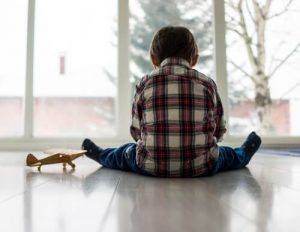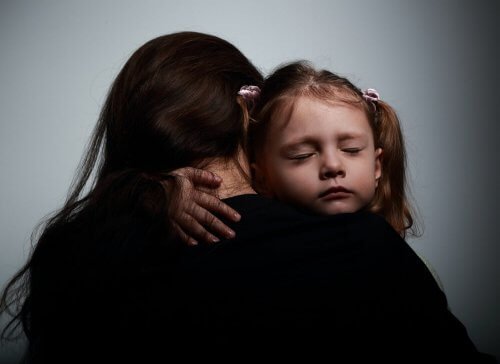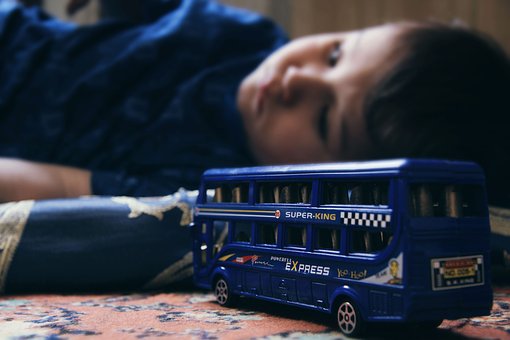Emotional Problems in Children: Causes, Symptoms and Treatment

Emotional problems in children can affect their relationships with others, their behavior and their mood. Parents should be able to detect these anomalies and solve them as quickly as possible because they harm children’s development in several ways.
Emotional problems are not exclusive to adults. Due to different circumstances, whether internal or environmental, children are affected by situations that are detrimental to their emotional health.
These appear when negative emotions have an unreasonable impact on the child’s life. However, this doesn’t mean that their importance should be underestimated.
Negative emotions are highly relevant in our lives. It is through fear that we protect ourselves from threats. We defend ourselves from attacks through anger, and with adrenaline we increase our abilities when necessary.
Emotional problems in children can be very bad for their physical and psychological well-being. Next, we’ll see how to detect and solve them.
Most frequent emotional problems in children
The emotional disorders that occur most frequently in children are:
- Lack of empathy: in these cases, children aren’t able to recognize other people’s emotions. Therefore, they don’t notice if someone is sad, happy or angry. Also, they’re unable to understand why they feel this way.
- Depression: it can be caused by several factors. It greatly alters children’s behavior and mood, as well as their school performance, their response to external stimuli and their relationships with others.
- Anxiety: although it is a defense mechanism against a threat or danger, excessive anxiety or unjustified situations can cause irritability, nervousness and restlessness. In addition, it also tends to be the source of other physical disorders, some of which are very serious.
- Intolerance to frustration: this makes it impossible to accept rules, norms or situations that aren’t convenient for them. It is usually expressed through anger and aggressive behavior.
- Phobias: these are excessive fears. Some can also be related to everyday things, such as rain. They cause great complications that affect the child’s mental stability and social life.
- Panic disorder: this is an intense fear accompanied by truly distressing physical symptoms for those who suffer from it.

Most common causes of emotional problems in children
As previously mentioned, there are two types of triggers for emotional problems in children:
Internal
These are linked to the emotional regulation of each human being.
Some factors that can determine a tendency to suffer emotional problems are: having an excessively strong character, being highly introverted, or suffering attention deficits, insecurity or failures in the processing of information.
“Life is 10% what you experience and 90% how you respond to it.”
External
The environment in which a child grows will greatly determine his or her development. If you are part of a family where there is violence, aggression and negativity, your emotional stability will be impaired.
Also, the school environment is equally important, since it offers children their first contact with peers in the outside world.
Therefore, it’s important that there are no situations of abuse or harassment. Other influences include bad relationships with teachers, not feeling like a valued member of the classroom, and poor academic performance.
How to detect emotional problems in children
The first thing that must be considered is that children will never come to tell you, “I am suffering from low self-esteem due to my classmates’ criticism.” That is why you need to be attentive to your child’s behavior, which will be how he channels all of his repressed feelings.
If children show nervousness, such as biting their nails, screaming, breaking objects or being aggressive, this may indicate a problem. There may also be some physical symptoms, such as tachycardia, nausea or muscle tension.

Also, pay attention to the behaviors your child does not exhibit. If you notice that he doesn’t trust his abilities, that he faces problems with a negative attitude or that he has an abnormal difficulty relating to others, try to find out what is going on in his mind.
Tips to treat emotional problems in children
The best recommendation for a case of emotional disturbance in children is to go to a professional.
A psychologist or psychiatrist, for example, could diagram an emotional education plan to teach him to control the various feelings that emerge in response to different situations. Emotional intelligence is the key weapon for fighting these types of disorders.
Also, you must be present throughout your child’s childhood. The best way to help children is by being understanding, open, willing to teach values and lessons at all times and, above all, showing them that we are available to them whenever they feel something is not right.
Emotional problems in children can affect their relationships with others, their behavior and their mood. Parents should be able to detect these anomalies and solve them as quickly as possible because they harm children’s development in several ways.
Emotional problems are not exclusive to adults. Due to different circumstances, whether internal or environmental, children are affected by situations that are detrimental to their emotional health.
These appear when negative emotions have an unreasonable impact on the child’s life. However, this doesn’t mean that their importance should be underestimated.
Negative emotions are highly relevant in our lives. It is through fear that we protect ourselves from threats. We defend ourselves from attacks through anger, and with adrenaline we increase our abilities when necessary.
Emotional problems in children can be very bad for their physical and psychological well-being. Next, we’ll see how to detect and solve them.
Most frequent emotional problems in children
The emotional disorders that occur most frequently in children are:
- Lack of empathy: in these cases, children aren’t able to recognize other people’s emotions. Therefore, they don’t notice if someone is sad, happy or angry. Also, they’re unable to understand why they feel this way.
- Depression: it can be caused by several factors. It greatly alters children’s behavior and mood, as well as their school performance, their response to external stimuli and their relationships with others.
- Anxiety: although it is a defense mechanism against a threat or danger, excessive anxiety or unjustified situations can cause irritability, nervousness and restlessness. In addition, it also tends to be the source of other physical disorders, some of which are very serious.
- Intolerance to frustration: this makes it impossible to accept rules, norms or situations that aren’t convenient for them. It is usually expressed through anger and aggressive behavior.
- Phobias: these are excessive fears. Some can also be related to everyday things, such as rain. They cause great complications that affect the child’s mental stability and social life.
- Panic disorder: this is an intense fear accompanied by truly distressing physical symptoms for those who suffer from it.

Most common causes of emotional problems in children
As previously mentioned, there are two types of triggers for emotional problems in children:
Internal
These are linked to the emotional regulation of each human being.
Some factors that can determine a tendency to suffer emotional problems are: having an excessively strong character, being highly introverted, or suffering attention deficits, insecurity or failures in the processing of information.
“Life is 10% what you experience and 90% how you respond to it.”
External
The environment in which a child grows will greatly determine his or her development. If you are part of a family where there is violence, aggression and negativity, your emotional stability will be impaired.
Also, the school environment is equally important, since it offers children their first contact with peers in the outside world.
Therefore, it’s important that there are no situations of abuse or harassment. Other influences include bad relationships with teachers, not feeling like a valued member of the classroom, and poor academic performance.
How to detect emotional problems in children
The first thing that must be considered is that children will never come to tell you, “I am suffering from low self-esteem due to my classmates’ criticism.” That is why you need to be attentive to your child’s behavior, which will be how he channels all of his repressed feelings.
If children show nervousness, such as biting their nails, screaming, breaking objects or being aggressive, this may indicate a problem. There may also be some physical symptoms, such as tachycardia, nausea or muscle tension.

Also, pay attention to the behaviors your child does not exhibit. If you notice that he doesn’t trust his abilities, that he faces problems with a negative attitude or that he has an abnormal difficulty relating to others, try to find out what is going on in his mind.
Tips to treat emotional problems in children
The best recommendation for a case of emotional disturbance in children is to go to a professional.
A psychologist or psychiatrist, for example, could diagram an emotional education plan to teach him to control the various feelings that emerge in response to different situations. Emotional intelligence is the key weapon for fighting these types of disorders.
Also, you must be present throughout your child’s childhood. The best way to help children is by being understanding, open, willing to teach values and lessons at all times and, above all, showing them that we are available to them whenever they feel something is not right.
All cited sources were thoroughly reviewed by our team to ensure their quality, reliability, currency, and validity. The bibliography of this article was considered reliable and of academic or scientific accuracy.
- Andrade Palos, P., & Betancourt Ocampo, D. (2012). Problemas emocionales y conductuales en niños: predictores desde la percepción de los padres y de los hijos. Acta de investigación psicológica, 2(2), 650-664. http://www.scielo.org.mx/scielo.php?script=sci_arttext&pid=S2007-48322012000200005
- Shapiro, L. E. (2002). La salud emocional de los niños (Vol. 16). Edaf.
- Smeke, S. (2009). Alcanzando la inteligencia emocional. Editorial Limusa SA de CV.
This text is provided for informational purposes only and does not replace consultation with a professional. If in doubt, consult your specialist.








